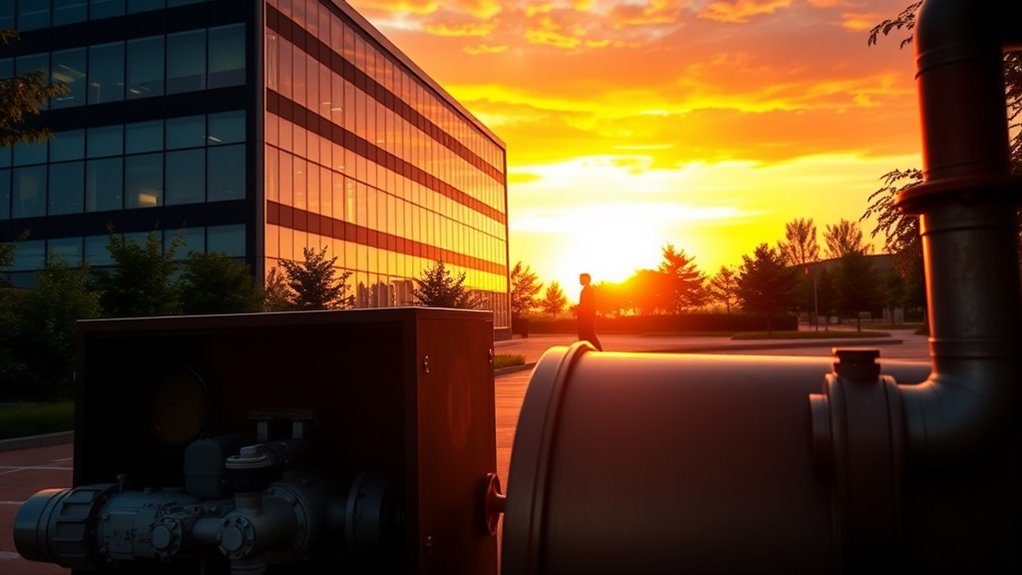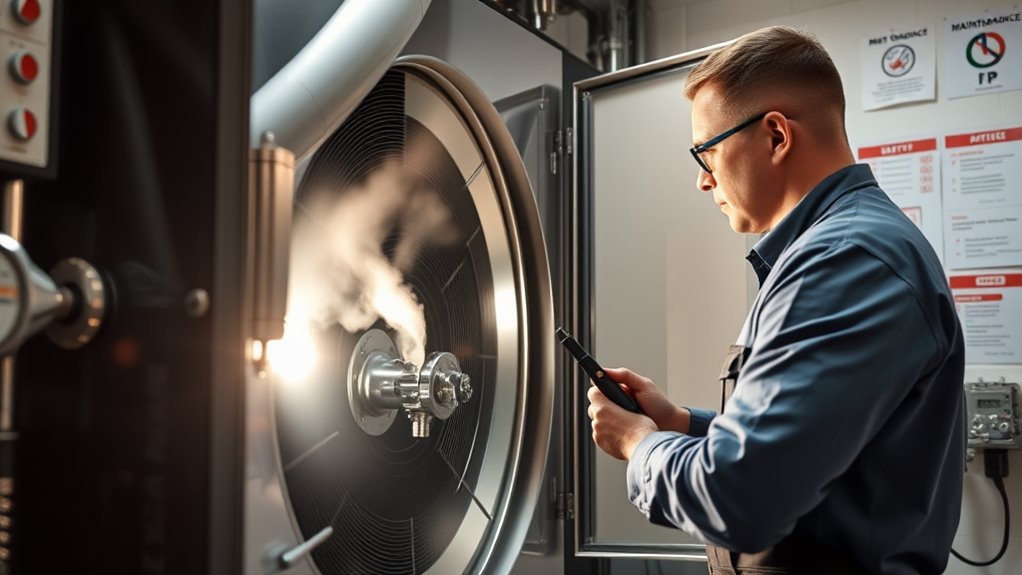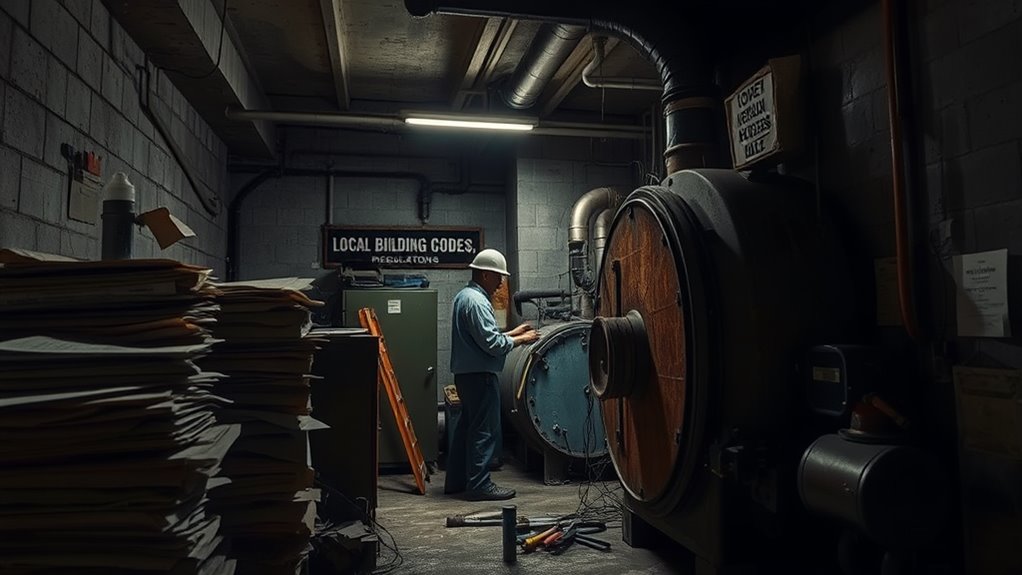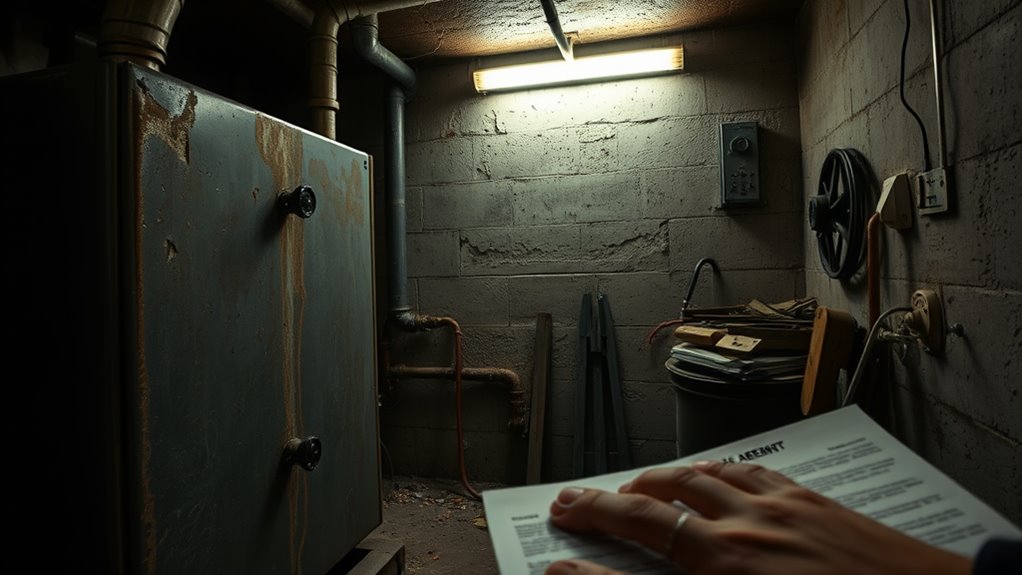In a commercial lease, a landlord's responsibility for boiler maintenance depends on the lease terms and local regulations. Typically, the agreement will specify maintenance obligations, often outlining whether the landlord or tenant handles these tasks. Regular inspections and servicing are essential for safety and compliance, affecting both parties. Understanding these responsibilities is important to avoid disputes. If you want more information on the intricacies of these responsibilities, there's much more to explore.
Key insights
- Landlords are typically responsible for maintaining and servicing boilers unless specified otherwise in the lease agreement.
- Lease agreements should clearly outline who handles boiler maintenance and repairs to avoid disputes.
- Local laws may impose specific obligations on landlords regarding boiler safety and compliance standards.
- Tenants must report any boiler issues promptly to ensure timely repairs and maintain safety.
- Effective communication between landlords and tenants is essential for managing boiler maintenance expectations.
Understanding Commercial Leases

When you enter into a commercial lease, understanding the intricacies of the agreement is vital, as it governs not only the use of the property but also the responsibilities of both parties involved. Different lease types, such as gross leases and net leases, define how costs are distributed, affecting your financial obligations considerably. Additionally, provisions regarding tenant improvements are essential; these stipulations outline what modifications you can make to the space and who bears the cost. Carefully reviewing these elements helps guarantee that your needs align with the landlord's expectations. By grasping the nuances of the lease, you can negotiate terms that better suit your business objectives and mitigate potential conflicts in the future. Moreover, it is crucial to understand the importance of commercial boiler service, as maintaining heating systems can directly impact the comfort and safety of tenants.
Common Boiler Maintenance Responsibilities

While the specifics of boiler maintenance may vary depending on the type and size of the system, certain common responsibilities remain crucial for guaranteeing ideal operation and safety. As a landlord, you're obligated to perform regular inspections to identify potential issues before they escalate. This includes monitoring pressure levels, checking for leaks, and verifying that safety valves function properly. Additionally, you must schedule routine servicing by qualified technicians to maintain efficiency and compliance with safety regulations. Regular maintenance, including routine inspections, is essential for identifying leaks and ensuring safe operation. Keep accurate records of maintenance activities, as this documentation is important for both legal obligations and operational integrity. By fulfilling these landlord obligations, you not only protect your investment but also promote tenant safety and comfort in your commercial property.
Lease Agreement Provisions

A well-structured lease agreement is essential for outlining the responsibilities of both landlords and tenants regarding boiler maintenance and other operational aspects. You'll want to pay close attention to the lease terms, specifically where maintenance clauses are concerned. These clauses should clearly define who is responsible for routine inspections, repairs, and overall maintenance of the boiler system. If the lease designates you as the tenant responsible for maintenance, make sure you understand the extent of your obligations. Conversely, if the landlord retains these responsibilities, confirm that they're adequately covered in the agreement. Clarity in these provisions helps prevent disputes and guarantees both parties understand their roles in maintaining a functional boiler system throughout the lease term. Additionally, it's crucial to ensure that the lease complies with local building regulations to avoid any legal complications.
Local Laws and Regulations

Understanding local laws and regulations is essential for you as a commercial landlord, particularly regarding boiler responsibilities. Local ordinances can greatly impact your operations, dictating specific safety compliance standards that must be followed. Failing to adhere to these regulations can result in legal repercussions and jeopardize tenant safety. Additionally, complying with Commercial Gas Safety Certificates is crucial for ensuring the safety of gas appliances and systems within your property.
Local Ordinances Impact
Local ordinances greatly influence the responsibilities of commercial landlords regarding boiler maintenance and safety standards. You must be aware that local regulations often dictate specific requirements for boiler installations, inspections, and ongoing maintenance. These regulations vary considerably from one municipality to another, emphasizing the importance of understanding the local heating codes applicable to your property. Failure to comply with these ordinances can lead to legal repercussions, including fines or liability for damages. Additionally, local authorities may require regular inspections to guarantee compliance with safety standards, which can affect your operational costs and tenant satisfaction. As a result, staying informed about local regulations is vital for safeguarding your investment and securing the safety of your tenants. Furthermore, proper regular maintenance is essential to ensure compliance and prolong the lifespan of heating systems.
Safety Compliance Standards
Guaranteeing compliance with safety standards is crucial for commercial landlords, especially when it comes to boiler operations. Local laws and regulations often mandate specific safety audits and compliance checks to guarantee that boilers operate safely and efficiently. You'll need to familiarize yourself with these requirements to avoid potential liabilities. Regular safety audits not only help identify any deficiencies but also demonstrate your commitment to tenant safety. Compliance checks, conducted by certified professionals, can reveal necessary upgrades or repairs, guaranteeing that your boiler meets all regulatory standards. Failure to adhere to these regulations can result in fines and legal repercussions, making it essential to stay informed and proactive in maintaining compliance. Your diligence can protect both your property and your tenants. Regular maintenance helps prevent error codes and enhances boiler longevity.
Tenant Rights and Responsibilities

As a tenant, you hold specific responsibilities that directly impact the maintenance and functionality of your leased space. It's essential to understand your obligations regarding maintenance, promptly report any issues, and adhere to the terms outlined in your lease agreement. Recognizing these aspects not only guarantees compliance but also fosters a positive relationship with your landlord. Additionally, being aware of energy-efficient heating solutions can help you communicate effectively with your landlord about any concerns related to heating systems in the property.
Tenant Maintenance Obligations
While tenants often focus on their rights, understanding their maintenance obligations is equally important for ensuring a harmonious landlord-tenant relationship. As a tenant, you have specific obligations regarding the upkeep and maintenance of the leased premises. These maintenance responsibilities typically include keeping the property clean, reporting minor issues before they escalate, and ensuring that any fixtures or appliances remain in good working order. You're also expected to avoid actions that could lead to damage or deterioration, which may affect your security deposit. By fulfilling these tenant obligations, you not only contribute to the property's condition but also foster goodwill with your landlord, paving the way for a more cooperative leasing experience. Additionally, it's crucial to recognize that regular maintenance, such as commercial power flushing, can significantly enhance the efficiency and longevity of heating systems within the property.
Reporting Issues Promptly
Timely reporting of maintenance issues is a fundamental aspect of both tenant rights and responsibilities. When you notice a problem, whether it's a malfunctioning boiler or another maintenance concern, prompt reporting is essential. This action not only fulfills your obligation as a tenant but also protects your rights, ensuring that necessary repairs are made in a timely manner. It is particularly crucial to report issues related to low pressure in the boiler system, as they can lead to the E119 error code and affect overall efficiency. Documenting the issue is equally important; detailed issue documentation can serve as evidence should disputes arise. Be sure to communicate the problem clearly to your landlord or property management, noting the date and nature of the issue. By taking these steps, you help facilitate a smoother resolution process, ultimately enhancing the safety and functionality of your commercial space.
Lease Agreement Terms
A thorough understanding of lease agreement terms is vital for tenants to navigate their rights and responsibilities effectively. Your lease will likely contain specific lease clauses that outline maintenance responsibilities, including who's accountable for the boiler system. Typically, landlords are responsible for guaranteeing that essential systems are operational, but some leases may shift certain responsibilities to you as the tenant. It's important to identify these clauses, as they dictate your obligations concerning repairs and maintenance. If the lease specifies that you must handle boiler maintenance, you must comply to avoid lease violations. Always make sure you're aware of your rights regarding maintenance issues and clarify any ambiguous terms with your landlord to prevent future disputes. Additionally, understanding boiler error codes can help you identify issues quickly and communicate effectively with your landlord when problems arise.
How to Address Maintenance Issues
How can you effectively address maintenance issues in a commercial property? First, establish a structured approach to maintenance communication. Create a system where tenants can report issues promptly, ensuring you document all complaints and responses. This documentation is essential for tracking repair timelines and ensuring accountability. Next, prioritize maintenance requests based on urgency and impact on business operations. Set clear expectations regarding response times and follow up with tenants after repairs are completed to confirm satisfaction. Regular inspections can also help you identify potential issues before they escalate. By fostering open lines of communication and maintaining a proactive stance on repairs, you can enhance tenant satisfaction and reduce the likelihood of disputes related to maintenance responsibilities.
Importance of Clear Communication
While clear communication may seem straightforward, its significance in commercial property management cannot be overstated. Effective communication between landlords and tenants establishes essential maintenance expectations, guaranteeing that both parties understand their responsibilities. When you convey your needs clearly, you minimize misunderstandings that can lead to disputes or costly repairs. For instance, if you outline specific boiler maintenance requirements, you help your landlord recognize their obligations and respond appropriately. This proactive approach not only fosters a collaborative relationship but also enhances the overall management of the property. Ultimately, prioritizing effective communication guarantees that maintenance issues are addressed promptly, safeguarding the property's value and tenant satisfaction. Clear dialogue is not just a courtesy; it's a vital element of successful commercial leasing.
Frequently Asked Questions
Who Typically Pays for Emergency Boiler Repairs?
When it comes to emergency boiler repairs, you'll often find that the lease agreement dictates who bears the costs. Typically, if you're a tenant, you'll be responsible for emergency repair costs unless the landlord has explicitly retained boiler maintenance responsibilities. It's essential to review your lease; it outlines obligations for repairs and maintenance. Understanding these terms helps you prepare for unexpected expenses and guarantees you know who to contact during an emergency.
Can Tenants Install Their Own Boilers?
As a tenant, you might wonder if you can install your own boiler. Generally, tenant modifications like this often require approval from the landlord, especially due to boiler regulations that guarantee safety and compliance. Before making any changes, it's crucial to consult your lease agreement and discuss your plans with the landlord. Unauthorized installations could lead to complications, including potential liabilities or disputes over maintenance responsibilities. Always prioritize adherence to regulations and contractual obligations.
What Happens if a Boiler Fails During Winter?
If a boiler fails during winter, you may face significant discomfort and potential business disruptions. Prompt boiler maintenance is vital to prevent such failures. Depending on your lease agreement, you might have specific tenant rights regarding repairs and maintenance responsibilities. It is important to review your contract to determine whether you're entitled to immediate assistance or compensation. Understanding these terms helps guarantee you're prepared and can advocate effectively for your needs during emergencies.
Are Landlords Liable for Tenant-Caused Boiler Damage?
When evaluating liability for tenant-caused boiler damage, you must consider the boiler maintenance responsibilities outlined in your lease agreement. Typically, tenants are responsible for their obligations, which may include proper use and care of the boiler. If damage arises from negligence or misuse, you could be liable for repair costs. However, if you've met your maintenance responsibilities, you might not be held accountable for the tenant's actions leading to the damage.
How Often Should Commercial Boilers Be Inspected?
You should schedule commercial boiler inspections at least once a year, adhering to safety inspection guidelines. Regular boiler maintenance frequency helps guarantee peak performance, enhances efficiency, and minimizes the risk of breakdowns. Depending on usage and local regulations, more frequent inspections may be necessary. Staying proactive about these inspections not only prolongs the boiler's lifespan but also guarantees compliance with safety standards, protecting both your investment and those who use the facility.
Summary
In summary, determining a commercial landlord's responsibility for a boiler hinges on the specifics of the lease agreement, local regulations, and maintenance obligations outlined within. It's essential to clearly understand these elements to protect your rights as a tenant. By maintaining open communication with your landlord and reviewing the lease carefully, you can effectively address any maintenance issues that arise, ensuring a well-functioning environment for your business operations. Clarity and diligence are key in these matters.

